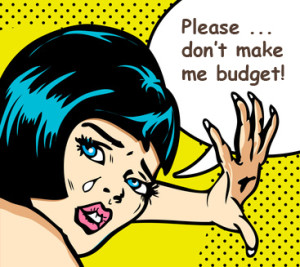 Click the link below if you’d rather listen than read:
Click the link below if you’d rather listen than read:
Everyone says they want to take control of their finances. Yet not everyone is willing to take the first step needed in order to do so.
And that first step is to prepare a budget. (Or a “spending plan,” if that’s easier to say.) Without one, it’s impossible to know how much money is coming in, how the money is being spent and how much is left in order to build a solid financial future. Or not.
So why the budget phobia? Why so difficult? Here are five possible reasons.
- Self-Worth Issues: We women are often too harsh on ourselves. We don’t want to budget in case the numbers we see are messier than we think they should be at this particular stage of life. That would somehow be a reflection on whether we are “good” or “bad,” “worthy” or “unworthy.” But that is confusing net worth and self worth. How much money we have has nothing to do with our worthiness; instead, it’s a simple snapshot of a moment in time. It reflects the series of events that have occurred in the past, and that can easily be changed in the future. In fact, a budget can provide the exact information needed to make those changes effectively.
- Mortal Fear: Fear is a discomfort about the future. Fear about money is a discomfort about whether or not there will be enough money sometime in the future. Some women don’t want to make a budget because it may show them how unprepared they are for the future. But the truth is that they are actually in greater fear because they are ignorant of their real financial situation. More often than not, women who do create a budget find they are better off than they expected (or at least they can get things under control more easily than they expected). So budgets are fear-killers instead of fear-creators.
- Not My Fault: It’s easier to blame someone else for our situation (whatever it may be) than it is to take responsibility. Maybe we blame the poor economy, our nasty bosses, Big Government or our sixth-grade math teacher for what’s going on financially in our lives. But once we start putting numbers to paper and creating a budget, it’s obvious that we are the ones who took the actions that resulted in those numbers. (It’s hard to blame our boss for the expensive new shoes we absolutely had to have. Or our sixth-grade teacher for the three dinners out last week.) On the other hand, if we’re responsible for those expenditures, we are also capable to changing them in the future. And a budget will show us where and how to do so.
- Shame on Me: As long as we don’t know our numbers, we can hide from what we suspect is our financial situation. We’ve heard others called “compulsive spender” or “irresponsible” or “out of control.” We’ve seen people who carry large debt looked down upon. After all, solid citizens don’t behave that way. So we continue to hide by not opening bills, credit card statements and bank statements. And by never preparing a budget. For the time being, it feels as if “ignorance is bliss.” But that bliss somehow feels pretty lousy.
- Guilt Trips: If we do decide to take responsibility for expenditures, we can look at the situation two ways: we can let it paralyze us with guilt and that paralysis often takes the form of beating ourselves up and wallowing in our poor choices. Or we can look honestly at the behaviors and recognize them as being unhealthy. We can move on from there based on healthier behaviors made obvious by having put together a budget in the first place. Guilt gets us nowhere.
The biggest problem with budgeting is that it is fraught with emotion. That’s what leads to budget phobia. Not because the process itself carries any emotion, but because we lay all sorts of emotions on it, starting with these five.
To end budget phobia, the key is to continually remind ourselves that budgets are just numbers. That these numbers can actually be the life preserver we need to get control of our financial lives, instead of what is causing us to drown.
Hmmm, could a budget actually be a friend and not a foe?
Let us know in the Comments section below if you have mastered the creation and use of a budget? If so, how has budgeting changed your financial outlook?
xxxxxxxx
 Bio: Sharon O’Day fixes financial lives. She is a tell-it-like-it-is money expert with a successful career in global finance, plus an MBA from the Wharton School. Today she specializes in getting entrepreneurial women over 50 back on their game so they can have more money, less stress and more joy. With her “Over Fifty and Financially Free” strategies, they take actions that lead to their ultimate goal: financial peace of mind.
Bio: Sharon O’Day fixes financial lives. She is a tell-it-like-it-is money expert with a successful career in global finance, plus an MBA from the Wharton School. Today she specializes in getting entrepreneurial women over 50 back on their game so they can have more money, less stress and more joy. With her “Over Fifty and Financially Free” strategies, they take actions that lead to their ultimate goal: financial peace of mind.





